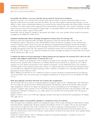 6 citations,
May 2021 in “Clinical Chemistry and Laboratory Medicine”
6 citations,
May 2021 in “Clinical Chemistry and Laboratory Medicine” Different ACE2 gene versions may affect COVID-19 impact based on age and suggest some hair loss drugs could be potential treatments.
 6 citations,
January 2015 in “Journal of The European Academy of Dermatology and Venereology”
6 citations,
January 2015 in “Journal of The European Academy of Dermatology and Venereology” Different hair loss types need accurate diagnosis for proper treatment.
 5 citations,
May 2018 in “Statistics in Medicine”
5 citations,
May 2018 in “Statistics in Medicine” Model improves accuracy in predicting hair loss effects.
 4 citations,
November 2021 in “Cancers”
4 citations,
November 2021 in “Cancers” The document concludes that understanding and managing hair loss in cancer patients is important, and more research is needed for better treatments.
 1 citations,
July 2022 in “Functional foods in health and disease/Journal of functional foods in health & disease”
1 citations,
July 2022 in “Functional foods in health and disease/Journal of functional foods in health & disease” Taking a probiotic supplement twice a day improved hair growth, skin hydration, and metabolic health in adults at risk of metabolic syndrome.
 August 2024 in “Frontiers in Nutrition”
August 2024 in “Frontiers in Nutrition” Antioxidant-rich diets may reduce hair loss risk, while pro-inflammatory diets may increase it, especially in women.
 September 2023 in “Deleted Journal”
September 2023 in “Deleted Journal” Post-bariatric surgery patients often face gastrointestinal issues, fatigue, dry skin, hair loss, and anxiety.
 May 2023 in “Sučasna pedìatrìâ. Ukraïna”
May 2023 in “Sučasna pedìatrìâ. Ukraïna” An 11-year-old child with total hair loss may have a genetic autoimmune disease, and the outlook for hair regrowth is not good.
 March 2023 in “International journal of trichology”
March 2023 in “International journal of trichology” Six genetic conditions are often linked to complete scalp hair loss in children.
 August 2010 in “Journal of Investigative Dermatology”
August 2010 in “Journal of Investigative Dermatology” New hair regrowth model introduced, imiquimod kills skin cancer cells, T-cadherin loss makes skin cancer more invasive, no strong link between PTCH1 gene and skin cancer after transplant, and male teens more likely to have hereditary hair loss.
 July 2010 in “British Journal of Dermatology”
July 2010 in “British Journal of Dermatology” New hair regrowth model proposed, imiquimod found to kill skin cancer cells, T-cadherin loss linked to invasive skin cancer, no clear gene link to skin cancer after transplant, and study on children's hair loss shows male dominance and genetic ties.
 69 citations,
March 1993 in “Archives of Dermatology”
69 citations,
March 1993 in “Archives of Dermatology” The document says there are five types of hair loss conditions and different causes, including drugs.
 47 citations,
June 2012 in “Genes & Development”
47 citations,
June 2012 in “Genes & Development” A mother's western diet can make her milk toxic, causing inflammation and hair loss in babies.
 33 citations,
August 1973 in “American Heart Journal”
33 citations,
August 1973 in “American Heart Journal” Propranolol can cause reversible hair loss.
 19 citations,
September 1989 in “Journal of The American Academy of Dermatology”
19 citations,
September 1989 in “Journal of The American Academy of Dermatology” Minoxidil treatment may cause hair loss.
16 citations,
February 2014 in “Iranian Red Crescent Medical Journal” Polycystic Ovary Syndrome (PCOS) affects Iranian women's feelings of femininity and self-image.
12 citations,
January 2014 in “Dermatology online journal” White hair regrowth in alopecia areata may be more common than thought.
 5 citations,
December 2021 in “Physiological Research”
5 citations,
December 2021 in “Physiological Research” Men, particularly those with hair loss, are more likely to get the virus, and those with prostate cancer may have milder symptoms. Testosterone's role in the disease is unclear, and the virus doesn't seem to harm male fertility. Women with PCOS might be at higher risk. More research is needed.
 5 citations,
January 1970 in “Journal of Nepal Paediatric Society”
5 citations,
January 1970 in “Journal of Nepal Paediatric Society” Hair loss can be a key sign of a rare type of rickets when vitamin D treatment doesn't work and advanced tests aren't available.
3 citations,
January 2022 in “Anais Brasileiros De Dermatologia” Androgenetic alopecia in teens is linked to obesity and other metabolic risks, needing early diagnosis and management.
 2 citations,
July 2018 in “Elsevier eBooks”
2 citations,
July 2018 in “Elsevier eBooks” Trichoscopy is a useful tool for diagnosing and managing hair and scalp conditions, often better than traditional methods.
 2 citations,
November 2017 in “Journal of Endocrinological Investigation”
2 citations,
November 2017 in “Journal of Endocrinological Investigation” The painting of an 18th-century Sicilian baroness shows she had hair loss, possibly due to ovarian issues, insulin resistance, or a specific type of tumor.
 1 citations,
August 2020 in “IntechOpen eBooks”
1 citations,
August 2020 in “IntechOpen eBooks” Old drugs like finasteride and spironolactone are being successfully used for hair loss and skin conditions, and many other drugs show promise for new uses in dermatology.
 May 2024 in “International Seven Multidisciplinary Journal”
May 2024 in “International Seven Multidisciplinary Journal” PCOS causes skin issues like excess hair, acne, and hair loss, needing a team approach for treatment.
 April 2024 in “Nigerian Postgraduate Medical Journal”
April 2024 in “Nigerian Postgraduate Medical Journal” Androgenetic alopecia is a common hair loss condition influenced by various factors and linked to psychosocial and cardiovascular issues.
 June 2023 in “Journal of General Procedural Dermatology and Venereology Indonesia”
June 2023 in “Journal of General Procedural Dermatology and Venereology Indonesia” Older, overweight women with children and a family history of hair loss are more likely to experience female pattern hair loss.

Modern skin cancer treatments can cause skin side effects and hair loss, affecting patients' quality of life.
 October 2022 in “Más dermatología”
October 2022 in “Más dermatología” Early diagnosis and treatment are crucial for managing female hair loss effectively.
 September 2021 in “CRC Press eBooks”
September 2021 in “CRC Press eBooks” Lichen planopilaris causes permanent hair loss and scarring due to damage to hair follicles and can be mistaken for other hair loss conditions.
 July 2018 in “British Journal of Dermatology”
July 2018 in “British Journal of Dermatology” Hair regrowth was seen in 83% of children with alopecia, immune system plays a role in the condition, and various treatments showed effectiveness for hair and nail disorders.



























